Why Did John Wooden Say
When John Wooden was a loftier school English instructor in S Bend, Indiana, during the 1930'southward, he grew disenchanted when he saw how much the parents fixated on their children's grades. Wooden believed this was foolhardy thinking. For a student who was not particularly gifted in a certain discipline, a B should be considered a fine grade. For some other who had more than natural ability just did not work as difficult, a B should be deemed less than satisfactory.
Wooden was a lover of the English linguistic communication himself, not to mention a burgeoning amateur poet. Equally he ruminated on the meaning of the word "success," he devised his ain definition: "Success is peace of listen that comes with the self-satisfaction in knowing you did your best to get the best that you were capable of becoming." Wooden may have become the most "successful" motorcoach in the history of college basketball game, merely he never lost sight of what that discussion did, and didn't, mean.
From 1964 to 1975, Wooden'south UCLA teams won 10 NCAA championships. That remains an all-fourth dimension record that is likely never to be broken. Yet, even though he collected more titles than whatsoever other coach, he rarely used the word "win" while talking to his players. He wanted them to focus on process, not results. He thought their emotions should remain on an even keel, and so he kept his pregame locker room speeches short, to the betoken, and mundane. He never provided them with detailed scouting reports on their opponents. Once the game began, he didn't want them looking over to the bench for instructions from him. He rarely called time outs. As their double-decker—their teacher—he believed his piece of work was mostly done during practices. The games would be their last exams.
Most Innovative Coaches in NCAA Basketball History
Dean Smith
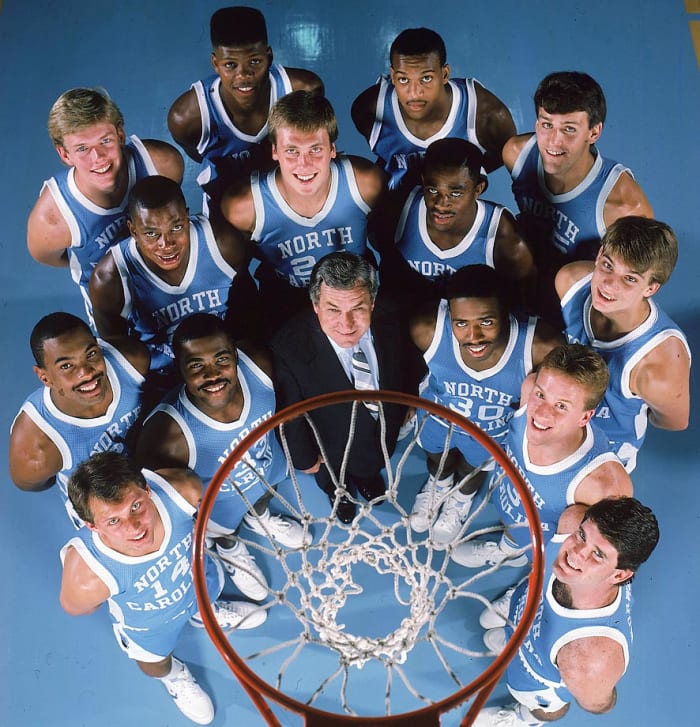
Manny Millan/SI
Hank Iba
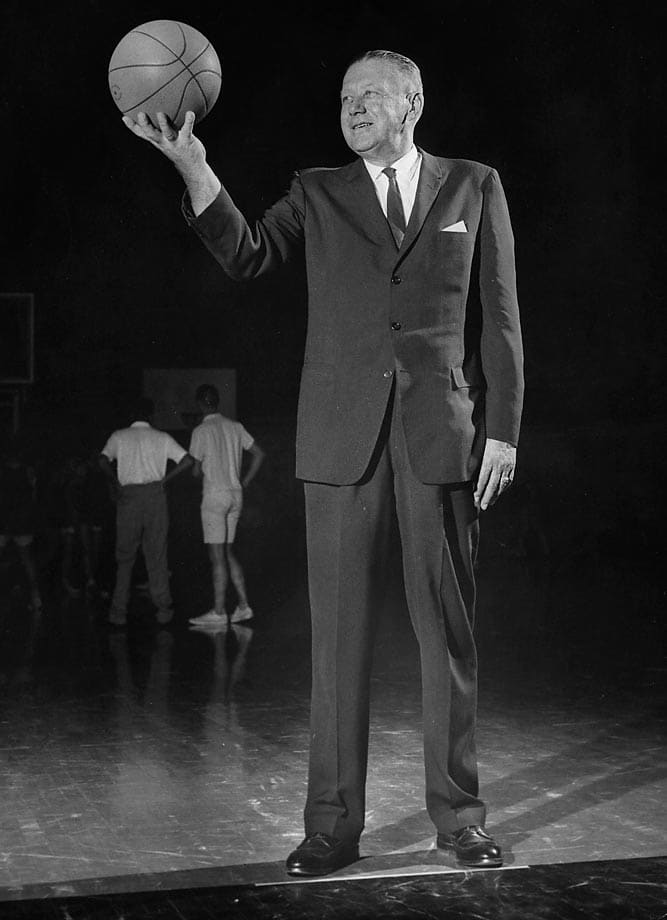
Sporting News Annal/Icon SMI
Jerry Tarkanian
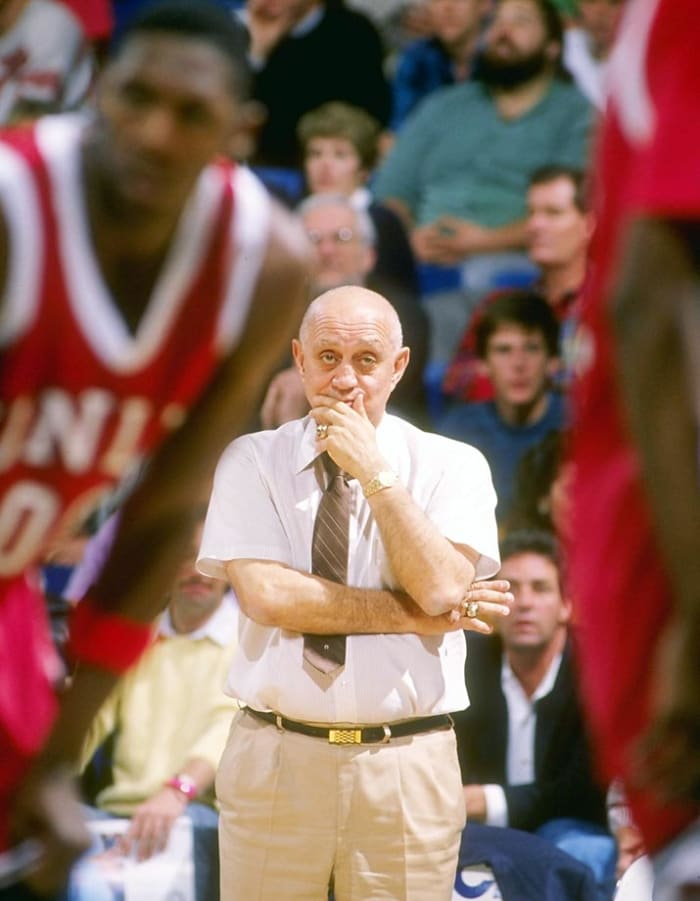
Ken Levine/Getty Images
Tex Winter
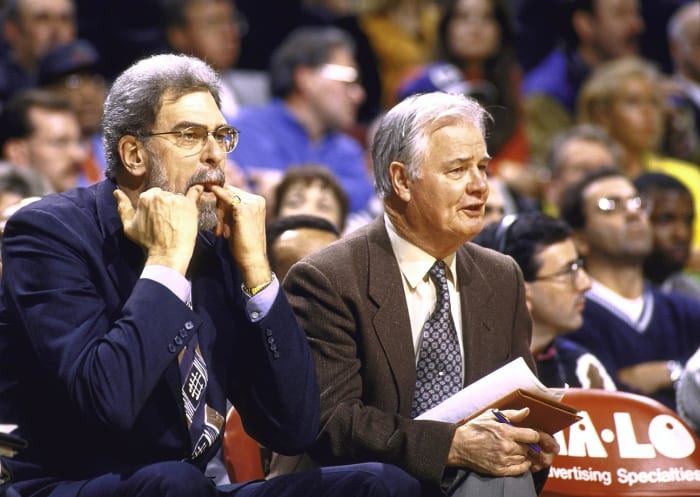
John Biever/SI
Bobby Knight
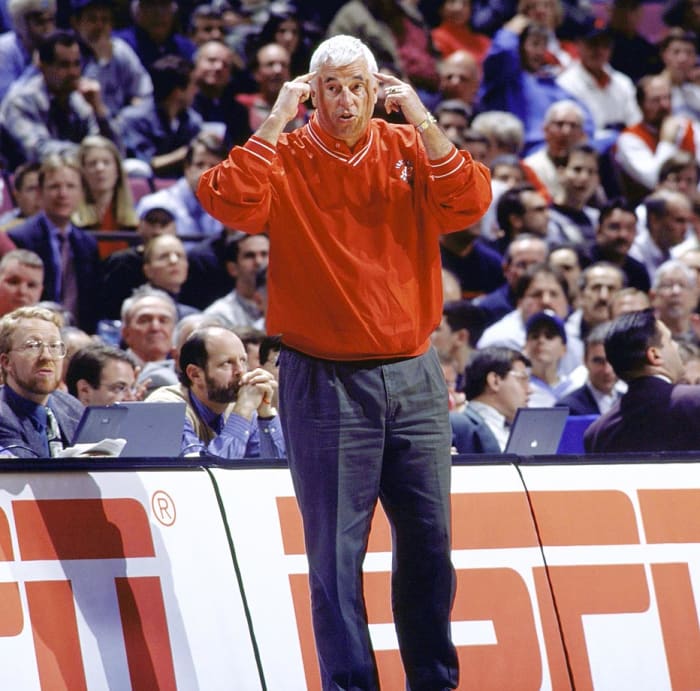
Manny Millan/SI
Rick Pitino
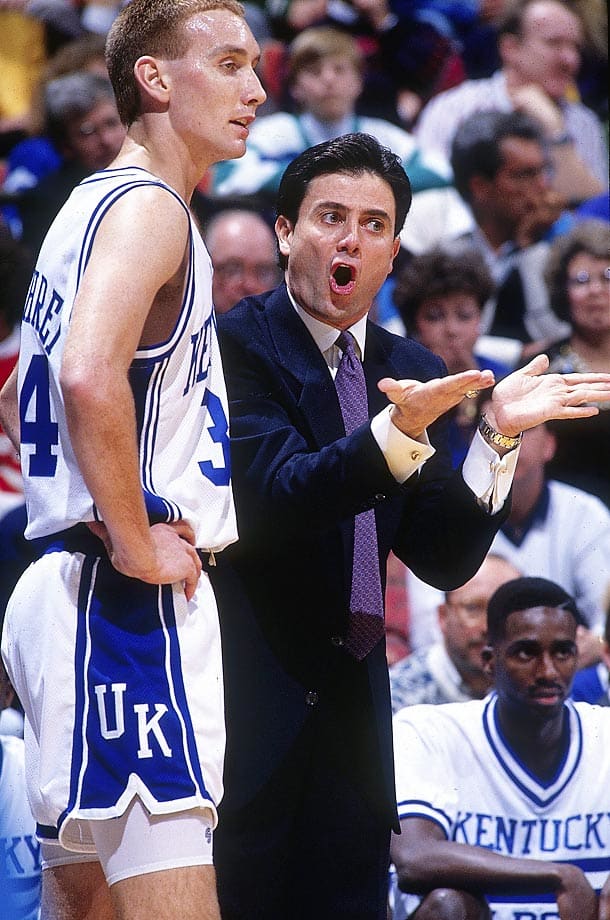
Manny Millan/SI
Pete Newell
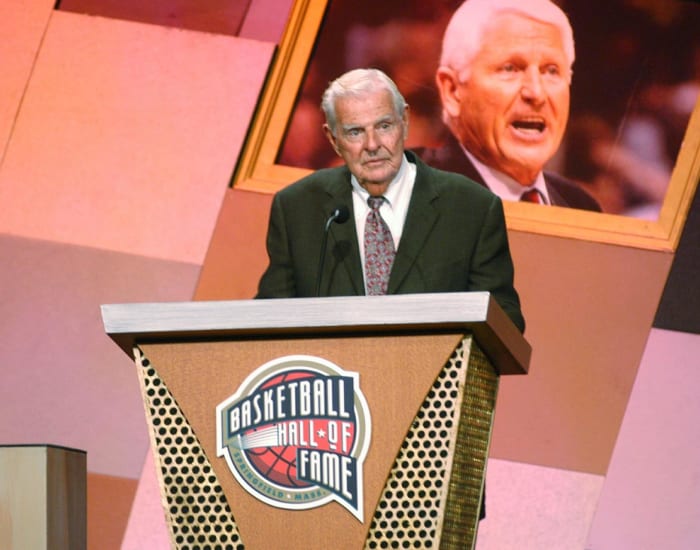
Jennifer Pottheiser/NBAE/Getty Images
Nolan Richardson
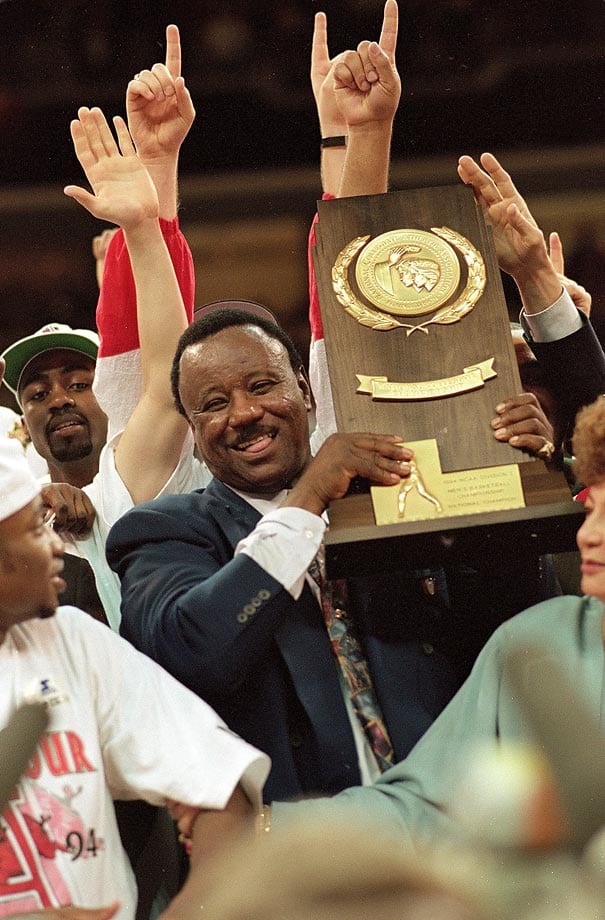
Damian Strohmeyer/SI
Guy Lewis
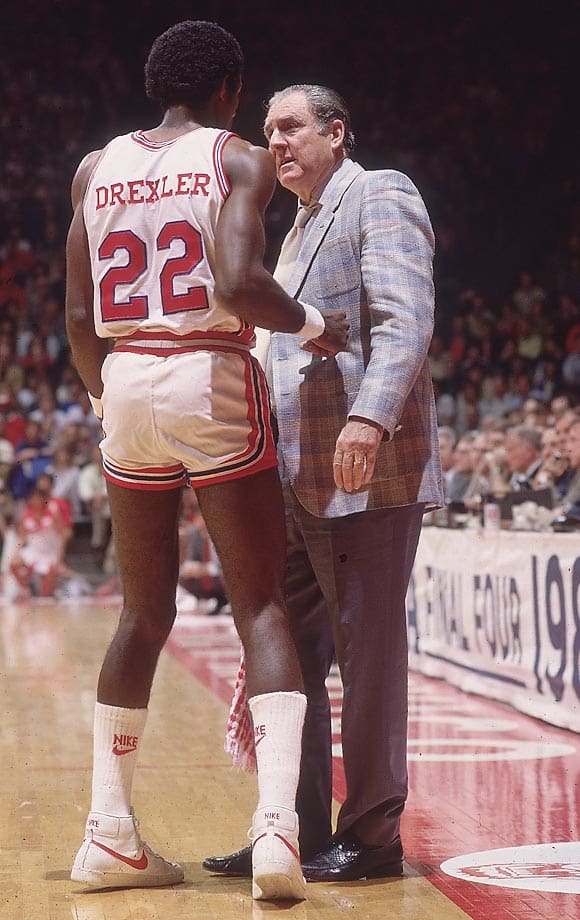
Andy Hayt/SI
Dick Bennett
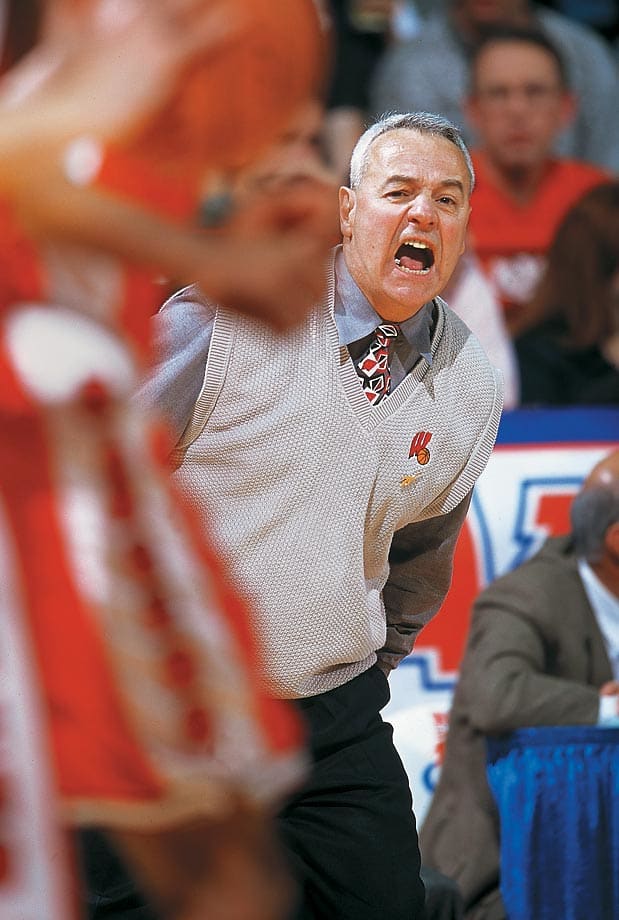
John Due west. McDonough/SI
John Wooden
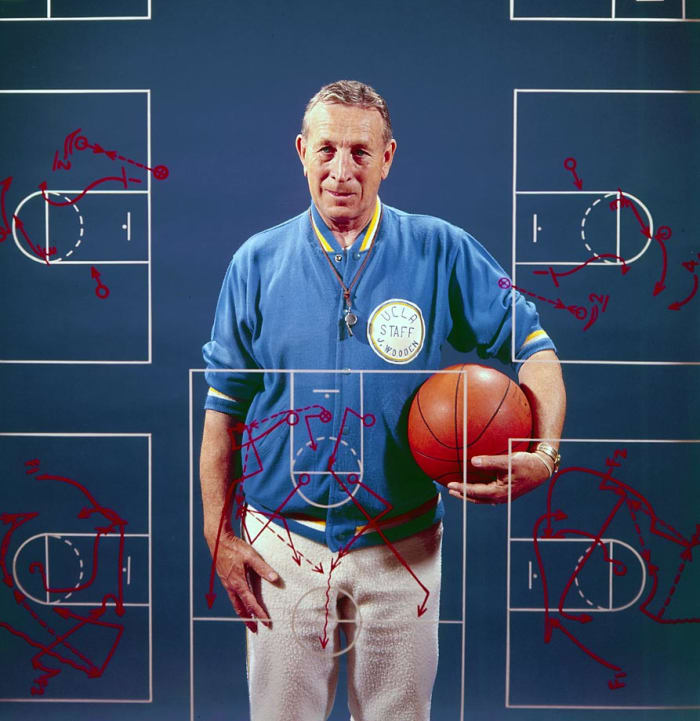
Neil Leifer/SI
John Calipari
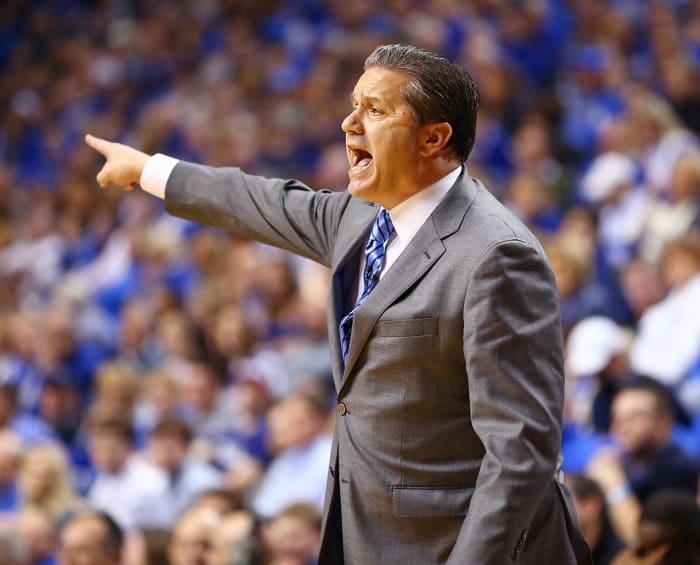
David Due east. Klutho/SI
This arroyo to coaching has oft been misconstrued as evidence that Wooden didn't care about winning. That was far from true. He was fiercely competitive, and in his early days at UCLA he developed an unflattering reputation for berating officials. Wooden didn't avoid the word "win" because he didn't care nigh the final score. He did it because he thought it would alleviate pressure, keep his players in the moment, and give them their best hazard to maximize their potential. If he had better players, and they played at their all-time, then he was confident they would win. If they played their best and lost, he could live with that.
In may means, Wooden was a Zen master before anyone had heard of that term. He tried to stay in the precious present, and he wanted his players to do the aforementioned. "There was total structure and consummate freedom," said Beak Walton, who was the star heart on ii of Wooden'southward title teams, in 1972 and '73. "He never used the blackboard. We never had a play. There was no number ane, no fist, no slash, no come-up-the-courtroom-and-practice-this. At that place was none of that. He never started practice with the word, 'what do you lot guys want to do today?' But he never held the states back."
Enter Here
Scroll to Go along
SI Recommends

Cousin Sal Bets The House
Fill out a perfect subclass, win Cousin Sal'south L.A.-surface area home.
When it came to style of play, Wooden was well ahead of his time. Many of his coaching peers preferred the slow, grinding, defense-oriented manner used by men like Oklahoma A&Thou's Henry Iba and Kentucky'south Adolph Rupp. Wooden, nonetheless, had learned the game while playing for Ward "Piggy" Lambert at Purdue, where Wooden was an All-America guard from 1929–32. Lambert stood only 5' 5", notwithstanding he had been a feisty role player himself for Wabash College in Crawfordsville, Indiana. Basketball game was a deadening game in those early on days—besides being many decades away from the shot clock, the rules called for a jump ball subsequently every made handbasket—yet Lambert was one of the first proponents of an up-tempo pace that emphasized quickness over size. At the time, that manner of play was referred to as "fire wagon baskeball." Lambert called it the "fast break."
Wooden was devoted to that mode of play throughout his coaching career, simply he understood from the start that it would merely work if his players were in top condition. This also dovetailed with Wooden's emphasis on maximizing potential in areas you can command. A role player is unable to increase his height, and there is but and then much he can practice to augment his quickness, but he can work hard to make sure he is in improve condition than his opponent. Later running his guys ragged in practice, Wooden created a fast tempo during games, and his teams typically won games in the final few minutes because they were in better shape. With that way, Wooden was able to win his first NCAA title in 1964 backside a full-court press and a starting lineup that did not include a role player taller than six' 5".
Oregon'due south Jordan Bong captains Sports Illustrated's 18th annual All-Gum Team
That 1964 squad—and specifically the dynamic backcourt of Walt Hazzard and Gail Goodrich—was also a prime case of Wooden's ability to tailor his motivation techniques to each histrion, depending on their personalities. Goodrich was sensitive, so Wooden had to requite him lots of pats on the dorsum. Hazzard was tougher and played better when he was aroused. So Wooden had to pat him "harder and lower," as he liked to say.
In his after years, Wooden had to notice different means to communicate with Lew Alcindor and Walton, who were arguably the 2 all-time players in the history of college basketball but had vastly unlike personalities. And towards the end of his career, as he faced the campus tumult of the late 1960'due south and early 1970'southward, Wooden expertly navigated the delicate balance between remaining true to his principles while withal adapting to the times that were a-changing.
All too often, Wooden was robbed of his peace of mind during his championship years as he faced unfair criticisms from the press and outsized expectations of the fans. He lost slumber, suffered a heart assault, and enjoyed the job less. That led him to announce his retirement before the final game of the 1975 NCAA tournament, fifty-fifty though he was still every bit good at his job as ever. That tournament ended with UCLA challenge Wooden'southward 10th and final championship. The former high school English teacher always maintained that one of the most of import words in the English language was "residual." It wasn't always easy for Wooden to maintain his even keel, but over the form of more than three decades, he walked away with his balance intact, and a success by any definition of the discussion.
Source: https://www.si.com/college/2017/03/08/john-wooden-greatest-basketball-coaches
Post a Comment for "Why Did John Wooden Say"